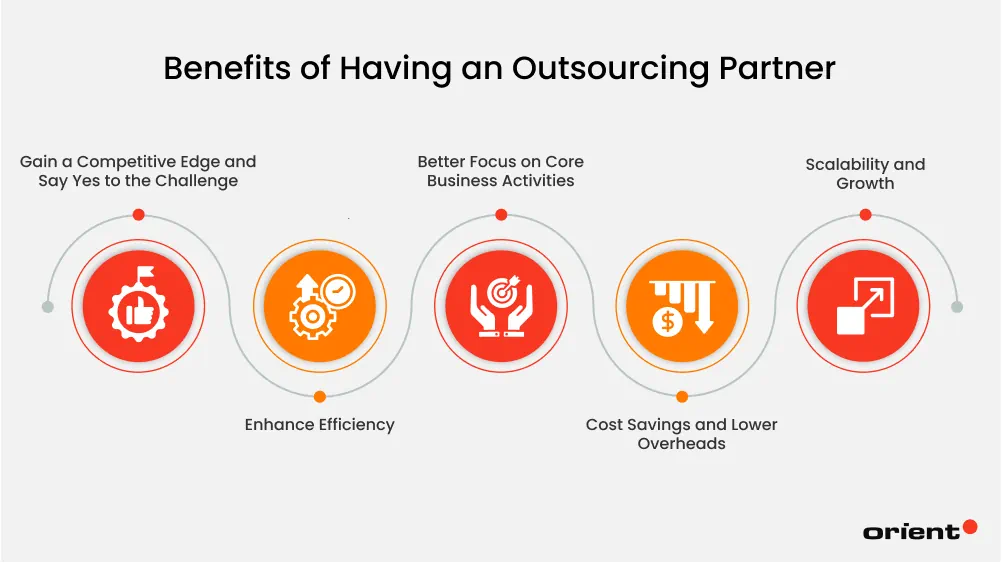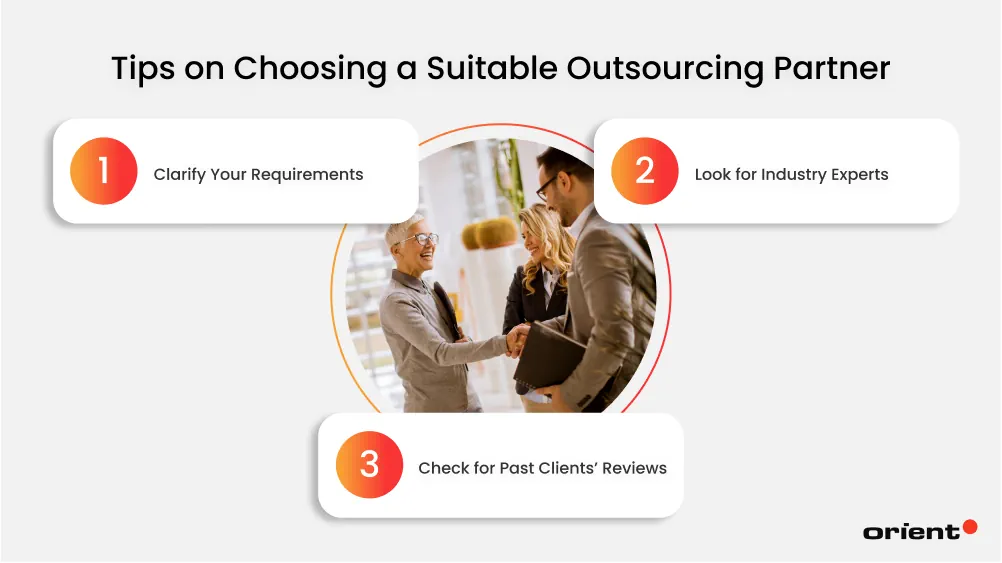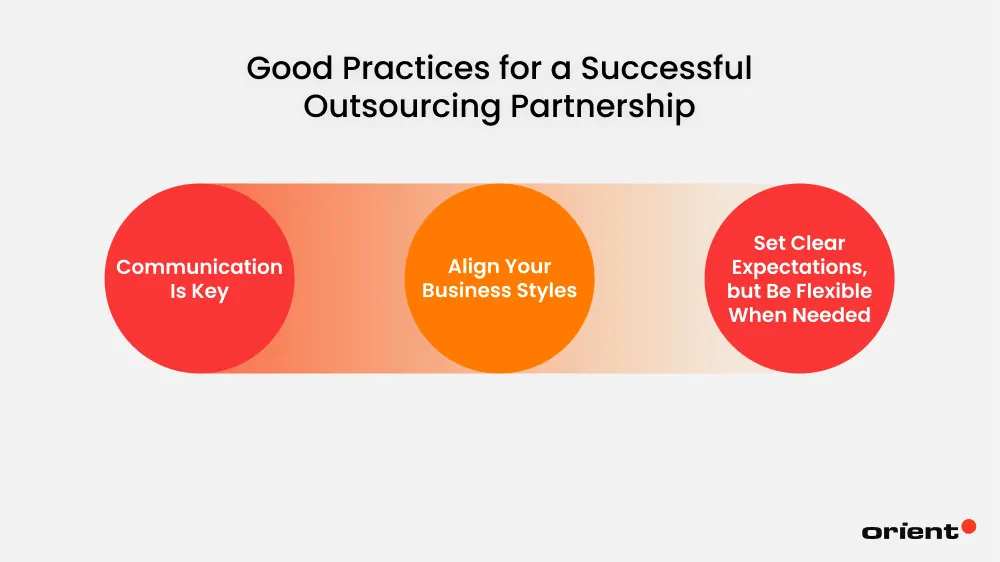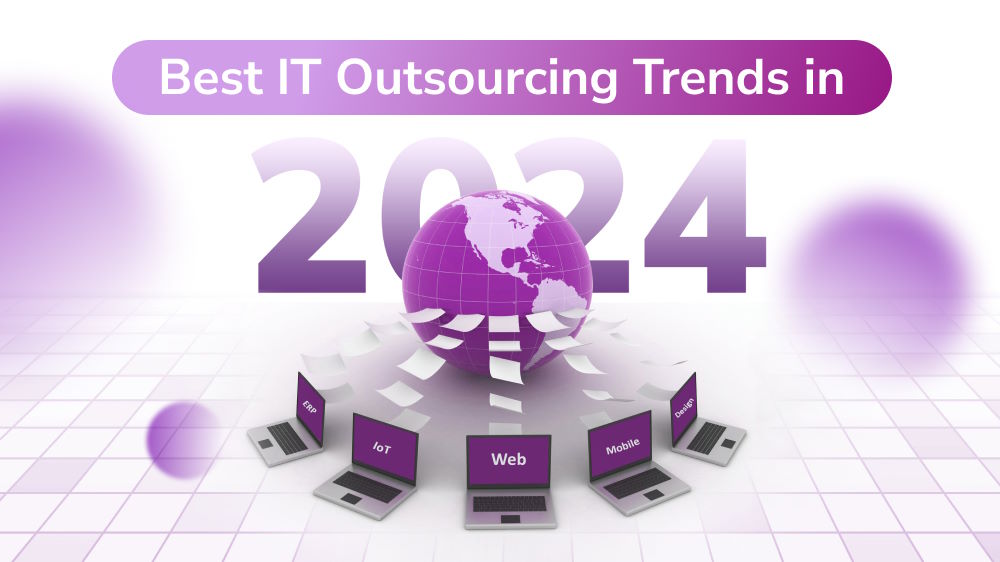
What You Need to Know About a Successful Outsourcing Partnership
It is easy to establish and engage in a new outsourcing partnership. However, the real challenge lies in nurturing it overtime. Discover top best practices that can guide you in maintaining a successful collaboration.

Content Map
More chaptersA leap of faith - that is what many think of an outsourcing partnership. After all, you choose to trust people outside of your organization. You may think you have little control or insight into what your partner is doing. It is normal to think that way.
An outsourcing partnership is a serious investment; therefore, it is important to first learn what makes an outsourcing partnership attractive. This article delves into some aspects of an outsourcing partner to help you decide whether this kind of partnership would enable your next phase of growth.
Key Takeaways:
- A reliable outsourcing partner not only handles tasks as agreed but also shares the same risks and rewards as clients do, fostering long-term partnerships.
- Clarifying the project requirements, looking for industry experts, and checking for past client reviews are some of the best practices for choosing the right outsourcing company.
- Clear communication is the key to successful outsourcing partnerships.
- You can look for outsourcing partners on online B2B platforms like Clutch, Toptal, GoodFirms, Upwork Enterprise, etc.
What Is An Outsourcing Partnership?
Outsourcing refers to the process of having another business provide services or produce goods for you.
A partnership is a formal agreement between two or more parties to run a business and split the profits.
An outsourcing partner handles tasks and projects handed over by its partner. An outsourcing provider tailors the service to your changing business objectives, needs, and goals rather than coming in to tackle a specific issue directly. They are an extension of your business. Often, a partnership involves a lot of communication along with shared risks and rewards.
Outsourcing Partner versus Outsourcing Vendor: What’s the Difference?

Vendors are paid to provide specific goods or services. They address certain pain points with products or services offered at fixed prices and within clear boundaries. If ordered in large volumes, they may offer discounts. However, vendors do not add any value to your business and are not as invested in your clients as a partner.
The largest difference between a vendor and a partner is the level of commitment. Simply put:
- Relationships with vendors are simple - they only address specific pain points. They offer you a services, goods, or materials based on requirements. There is no further involvement with your workflow or clients.
- A partner is an extension of your own business. They are willing to invest in long-term commitments and relationships. They focus on creating impact and adding value. They share the same risks and rewards as your company does.
This article does not aim to dismiss the need for a vendor but rather focuses on why an ideal outsourcing partner is capable of helping you win in your industry in three main ways:
1. They want to have a meaningful impact on your business. They are willing to seriously invest in essential resources to implement optimal strategies.
2. An experienced partner has gone through a fair amount of wins and losses in a variety of projects. These valuable experiences can provide you with unique insights.
3. Partners are not only experts in what they do, but they are also familiar with navigating time zones and cultural difference.
All these details play a major role in establishing a strong outsourcing partnership.
Why Consider an Outsourcing Partnership?

Understanding the difference between a vendor and a partner might make it easier for you to decide what your company truly needs. By this point, if you and your team are confident that you want to establish a sound and successful outsourcing partnership, then let’s dive a little bit deeper.
First, let’s start by understanding what an outsourcing partnership can do for you and your business.
Gain a Competitive Edge and Say Yes to the Challenge
In today’s business environment which is so tense and competitive, companies are constantly looking for ways to scale up and seize every possible business opportunity.
A strategic outsourcing partner makes sure that you not only have access to a large pool of talent and the newest technological capabilities, but that your team also stay at the top of your game. A successful partnership with the right outsourcing provider allows you to plan ahead and get prepared for new developments in the market.
The last thing a scaling business can afford is to miss a business opportunity. This would not happen without the support of a successful outsourcing partnership. You no longer need to feel as if you were stretching your in-house resources thin to meet established goals or customer deadlines. After all, you have an entire organization behind you to handle new contracts and take on new challenges.
Enhance Efficiency
An outsourcing partner acts as an extension of your business while accepting the same benefits and risks as you do. Hence, they will look for ways to enhance efficiency in their area of expertise. For example, outsourcing firms are well known for their ability to hire highly qualified staff. By having a team of experts readily available, the time to market is shortened, as you no longer have to go through the lengthy process of recruiting, training, and maintaining the team.
All in all, an outsourcing partnership has the capabilities and resources to boost your productivity.
Better Focus on Core Business Activities
Your potential outsourcing partner should be an expert in what they are doing. They should provide you with high-quality services per agreement and help you better understand how they fit into your overall operation. They add value, like the rear engine, which enables your business to continuously churn out new and better results.
Therefore, you and your team have the time and energy to focus on the critical functions of your business and the vital client relationships that drive value. The salvaged time and energy clear space for you to draw up important objectives and core competencies or scale up the business instead of scrambling around to hire experts or figuring out ways to best perform a task that is out of your scope of expertise.
Cost Savings and Lower Overheads
Often, outsourcing means that you are paying only for what you need. This means you are not paying to recruit a whole team, training, and their benefits; neither do you pay for equipment or hardware, and right at the time you want to scale up your project for business growth, the right outsourcing partner can flexibly renew the contract and align with your latest goals. If you are outsourcing nearshore or offshore, the hourly rates of outsourced staff are often lower.
Scalability and Growth
Scalability is one of the most critical strengths in today’s turbulent conditions - and some even consider it to be even more important than profitability. With an in-house team, though, it can be challenging trying to scale up or down in a short amount of time.
Let’s take a software outsourcing partnership as an example. Your in-house IT team has been doing quite well for some time, handling small to medium-scale projects. However, as your reputation grows, your clients are now looking to collaborate with you on bigger projects. As much as you want to take on these valuable opportunities, you simply do not have the resources to do so. Hence, your competitor gains a better competitive advantage and gets the project.
An outsourcing partnership is your backup plan. Instead of taking months, a team of experts knows what they are doing, and they may only take a few weeks. This is important, as it allows your team to sustain growth and prevent a temporary pause.
With a software outsourcing partner, you no longer need to worry over the fact that there is insufficient resource or no specialized resources available to scale up. Being able to handle bigger, more important projects earns your company a good reputation and fosters long-term growth.
Tips On Choosing a Suitable Outsourcing Partner
Deciding upon the right partnership is the first step toward the growth you are gearing up for.

Clarify Your Requirements
Before approaching an outsourcing company, audit your in-house resources and needs. Make a rough estimate of the resources and advantages necessary for an upcoming expansion. These could be skilled workers, infrastructure, market presence, and insights.
Clarify your expectations with specific metrics to measure the success of a future partnership, such as the specialized expertise, the expected market share, and the number of customers upon joining hands with a partner.
If your company is unsure about the requirements, take your time to figure it out. Vague business needs and requirements provide poor guidance in moving forward. No partner should be expected to read your mind and deliver wonderful results.
Look for Industry Experts
A credible partner should bring insights, experiences, and connections that add value to what you already possess. They understand how the partnership works and are willing to make reasonable compromises for a win-win arrangement.
When comparing a shortlist of outsourcing partnerships, consider the following:
- Their proven track record
- Technical expertise and industry experience
- Available tech stack
- Commitment to your project
- How they deal with complications and obstacles like data security or intellectual property theft
Be mindful when matching the partner’s technical expertise to your needs - both sides should want to and are able to, grow at the same pace. If they are excellent in handling a narrow range of technologies, but you are aiming for a wide-ranging digital transformation, this may not be a good fit for you.
Check for Past Clients’ Reviews
How is your partner’s reputation? Look for testimonials or reviews from online platforms like Clutch to get a better idea of who you would share the spotlight with. Ask around for references from your industry contacts. After all, choosing to trust someone outside of your organization is not an easy decision. No one would want to work with a team that is late to meetings, forgets deadlines, or is unresponsive to urgent demands.
Good Practice for a Successful Outsourcing Partnership
Here are some tips for maintaining a long-lasting, successful outsourcing partnership.

Communication Is Key
During the first few months of your outsourcing partnership, emphasize transparent communication. Communication is one of the key factors in building mutual understanding and a strong relationship. So, how should you go about it? Below are some practical tips to help you out.
Set out goals. These goals can be monthly, weekly, or daily goals. Draw up a plan to work towards them: what is the priority? What should be focused on? What are the best practices? Take notes and make sure everyone is looped in on the process and status of the partnership. Do check and reflect often to see if the expectations are met.
Schedule regular updates between your in-house team and the outsourcing team. Reach a consensus on the milestones where both teams touch base on how the projects are going. Also, don’t forget to leverage the power of clear communication channels to ensure that the whole team is always on the same page.
Align Your Business Styles
It goes a long way to understanding your outsourcing partner’s work culture and values. Consider these questions:
- How like-minded are you in reaching the same goals?
- Where do you stand on mutual business issues?
- What qualities are you looking for in a team? Would you want a team that is more casual and upbeat, or would you prefer a more formal work style with a respected hierarchy?
- How do the cultural particularities of the outsourcing partner affect your collaboration?
Make use of the trial period to test your alignment, as it allows time for both partners to adjust. There will be some incompatibilities, but they can be overcome by establishing a satisfying degree of mutual understanding early on. The best outsourcing partner is not the one who offers the best pricing models but one who is well aware of different business cultures and strives to adapt to the standards and work culture that you can reasonably expect.
Set Clear Expectations, but Be Flexible When Needed
The Service Level Agreement (SLA) sets out the fundamental aspects of an outsourcing partnership, such as ground rules, expectations, and scope of responsibilities for each side.
However, it is normal for unexpected developments to arise in an IT project, in which case your outsourcing partner may have a different approach from yours. It is worthwhile to consider your partner’s suggestions and feedback. Be flexible when needed. Your final product might turn out even better than initially expected. After all, both sides of an outsourcing partnership share the same risks and rewards.
Final Thoughts
A successful outsourcing partnership brings numerous benefits to the table. They allow you to gain a competitive edge, save time and money, boost productivity, and gain scalability.
It is easy to establish and engage in a new outsourcing partnership. The real challenge is how to maintain it. The key is to communicate. Be transparent and set out clear business goals, expectations, and ground rules. The first few months, or the “trial period,” is a time for you and your partner to test and adjust to see if it is possible to work together in the long run. Make sure you make good use of it.
If you are on the journey of looking for the right outsourcing partner, take Orient Software into consideration. While we don’t claim to be the best outsourcing provider on the market today, we take pride in being a software development company that has delivered genuine value to customers across various industries for the past 20 years. Contact us for further discussion about your future project and get a detailed cost estimation.
Frequently Asked Questions (FAQs)
1. What engagement models are available when partnering with an outsourcing company?
Though different software development companies provide different pricing models, there are three main approaches you can consider, which include:
- Dedicated software team: acts as an extension of your in-house team and works exclusively for your project.
- IT staff augmentation: lets you hire external developers or tech specialists to temporarily fill skill gaps in your existing team.
- Software development outsourcing: is the practice of contracting an external company to handle all or part of your software development process.
2. What services can be outsourced?
- Custom software development
- Web application development
- UX/UI design
- QA & testing
- AI & data science
- Cloud computing
3. How do I protect my intellectual property (IP) when partnering with an outsourcing company?
- Sign a Non-Disclosure Agreement (NDA)
- Include IP ownership clauses in your contract
- Choose partners who follow ISO 27001 or equivalent data protection standards
4. What should be included in the outsourcing contract?
Your agreement should cover:
- Scope of work (SOW)
- Timelines and deliverables
- Payment terms
- Confidentiality and IP ownership
- SLAs and quality benchmarks
- Termination clauses and dispute resolution
5. What are the steps for choosing the right outsourcing partner?
- Step 1: Define your specific goals and needs
- Step 2: Start your research on potential outsourcing partners
- Step 3: Check their portfolio for relevant experience and expertise
- Step 4: Read client reviews and case studies to learn about their reliability and client satisfaction
- Step 5: Evaluate communication and culture fit by setting up intro calls
- Step 6: Ask about their processes and tools
- Step 7: Assess data security and compliance
- Step 8: Request a proposal or trial project before full commitment
- Step 9: Review the contract and pricing according to prior agreement
- Step 10: Choose and onboard your software development partner






